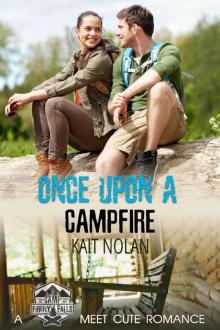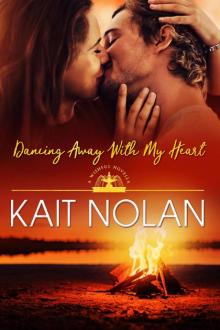- Home
- Kait Nolan
To Get Me to You Page 19
To Get Me to You Read online
Page 19
“Son of a bitch.” Cam slapped a hand against the Bobcat.
“Having a bit of bad luck there, Crawford?”
Cam turned and tensed as he caught sight of Roy McKennon. He looked rough, but sober in Carhartts and a flannel shirt. Had he been here from the start? Cam couldn’t remember. He hadn’t seen Roy since Liam’s welcome home party, and he didn’t imagine that the other man had changed his opinion on what Cam was trying to do regarding GrandGoods. Was he angry enough to try to sabotage the equipment?
“Little equipment malfunction, as it happens.” Cam kept his tone neutral.
Roy looked from the Bobcat to the nursery truck, where more than a dozen trees waited to be planted. “You ain’t gonna get that done with whatcha got.”
That was the plain truth, and Cam couldn’t argue it. He’d have to go track down Norah, see if she wanted them to try to put in what they could the old-fashioned way or hold off until he could get the tree spade repaired. “It’s always somethin’.
“Reckon you could use some strong backs.”
“Sorry?”
“I happen to know some.” The older man turned and whistled.
Across the green, nearly a dozen men broke away from a cluster of pick-up trucks and headed their way.
Catching Cam’s wary look, Roy said, “We came to work, same as everybody else. Be obliged if you’d let us help.”
Too stunned to reply, Cam could only stare for a moment.
“I may not agree with you on all your politics, but it’s a good thing y’all are doin’ here. Been a long time since Wishful had something good.”
“Hopefully this is the start of a new trend.” Cam offered a hand. “I’d appreciate the help.”
When Roy’s friends joined them, Cam divided them into teams of three and assigned them spots to dig, giving instructions on width and depth of the holes they’d need for the root balls of the Bradford pears they were putting in. He wiped out Tyler’s supply of shovels to cover the extra labor, but it was well worth it seeing the teamwork and camaraderie among men who hadn’t had reason to smile in a good long while.
More than an hour passed before he made it back to Hank and Grace, who were discussing the congestion of vehicles from all the out of town volunteers.
“I’m pretty sure I saw Aggie Crockett circle the block four times without finding a space,” Hank said.
It was exactly the opening he needed. “That’s just a fraction of the kind of impact GrandGoods would have,” Cam said. “The typical warehouse club of the size they propose has average of five thousand vehicle trips per weekday, depending on the size of the store. And weekends are bigger.”
“That’s…a lot,” Grace admitted.
“That’s more than double our entire population of drivers. We’ve got to think about expenses for the city, like road maintenance and police force that would be required to compensate for an increase of that magnitude.”
“It would be a significant burden on our existing tax base.” Hank looked reflective. “Certainly supplemental funding from the state hasn’t been forthcoming. I don’t see that getting any better in the future. Not under the current administration anyway.”
“So if they built, we’d get the excess traffic from people who don’t live here, don’t contribute to the roads they’re wearing out. And on top of that, all the land in the general vicinity of the store would decrease in property value because of traffic and noise and the kind of chain-oriented urban bloat that tends to go along with these big box stores. And that’s not even touching on the impacts on the environment.”
“You raise some good points, Cam. But what’s the alternative?” Grace asked.
“If we focus on revitalizing downtown, really supporting local retail and creating a climate that will appeal to entrepreneurs looking for good locations to invest in small business, it’s a benefit to the entire community. People don’t have to drive as far to conduct their day to day business. That means fewer vehicle miles logged, lower accident rates, lower vehicle emissions. And it encourages more of a walking culture, which improves the health of the local populace and strengthens community ties because people are out and about and interacting instead of trapped behind the wheel.”
“I certainly like the idea of that.”
“The fact is, we don’t need what GrandGoods is offering. We don’t need someone from outside to come in and save us. Not at that kind of expense. We can take care of our own if we’re just willing to work together to find a solution that will truly benefit the community.”
“That’s not going to be a popular position,” Hank said.
“It’s not our job to be popular.” Cam had resigned himself to that a long time ago. “It’s our job to work in the best interests of Wishful. And that means looking at long-term impact. Look, I don’t want to belabor the point. Just promise me you’ll consider that when you cast your vote about GrandGoods and their proposal.”
“Fair enough.” Grace packed the soil around the roots of some ivy. Dusting her hands off, she straightened, looking at something back toward the green. “Is that Abe Costello?”
“That’s sure as heck his championship smoker.”
Cam turned to look. “What on earth?” As he watched, Abe backed the enormous trailer onto the green. “I’d best go see what this is about. Can you two finish up these planters and get them in place?”
“Go ahead, son. We can handle a bunch of pansies,” Hank said.
The truck was parked and the driver out of the cab by the time Cam made it over.
“Uh, Abe. Whatcha doing with Black Beauty here?”
The old man merely grunted and lowered the trailer foot. “Got a bunch of volunteers. They gotta eat. Least we can do to feed ’em for their trouble. McSweeney’s is donating fixins, the Rotary Club is donating burgers and hot dogs for lunch, the Kiwanis Club is demolishing the butcher section for supper, and the Methodist, Baptist, and Presbyterian women’s groups are in some kind of competition to donate sides.”
Cam blinked at him, his brain not quite catching up to what he’d heard. “You’re planning to feed the volunteers?”
“That’s what I said. Don’t just stand there, boy. Help me get this wood out of the truck.”
Cam leapt into action.
Smoke was curling toward the sky by the time he got back to the landscaping. As the afternoon progressed and the scents of grilling meat filled downtown, more tables and tents popped up on the green. Clay Turner hauled out the PA system from the community center and added a party feel to the proceedings, playing DJ while the work progressed at a furious pace.
It shouldn’t have come together so fast. Not given the state downtown was in that morning. But by the time the news van pulled up late that afternoon, every business downtown had at least one fresh coat of paint, windows sparkled, displays had been updated, and the concrete planters had been set in intervals along Main Street, a pop of color that tied in with the new hanging baskets mounted on all the light poles. Teams were working on getting up new awnings as the reporter climbed out.
Norah appeared from somewhere, managing to look polished and put together in her jeans and camp shirt, despite the paint liberally streaking her legs. She shook hands with the reporter and launched into an animated explanation of what was going on, gesturing to various businesses along Main Street.
His mother stepped up to join him.
“Hey.” Cam pulled her in for a one armed hug. “I haven’t seen you all day.”
“I’ve been recovering the booths at Dinner Belles. They’re a bit harder than the dining room chairs I did last year, but they came together.”
“It seems everything’s coming together. In more ways than one.”
She looked around in satisfaction. “This is amazing. I haven’t seen this kind of community spirit and unity in years. It’s all because of you and Norah.”
“We make a good team.” Cam turned his gaze back to where she stood with the reporter. “But none of this wo
uld’ve happened without her. She single-handedly brought in a freaking army. Just by asking.”
“Sometimes that’s all it takes, for someone to have the courage to ask. She’s not afraid to do that. She doesn’t expect everyone to jump at the snap of her fingers, and she’s not…entitled like her father, but she’s not afraid to ask because she knows her mind and she knows her worth. I hope you know it, too.”
“I’ve been counting my blessings since the day she walked into my life.”
“Good.” Leaning up to press her cheek to his, she said, “In case nobody else has said it, thanks for taking the hard stance on this GrandGoods thing, baby. It’s what needed to be done.”
“For the first time, I’m starting to believe that with Norah’s help, it just might be enough.”
Chapter 15
“Valentine’s Day may be over, but love is still in the air here in the tiny town of Wishful. Residents and volunteers gathered today to give downtown some much needed TLC. I’m here with Norah Burke, public relations chairwoman of the citizen’s coalition behind the project. Can you tell us a little about what’s going on here?”
Norah leaned forward from the sofa, her hand clamped around Cam’s as she and the rest of the Campbells watched the interview on the ten o’clock news. The station played the whole thing, unedited, as she succinctly explained the origins of the coalition, the threat to their small town way of life, and their hope of reminding the people of what’s really important. She came off charming, erudite, and welcoming, finishing up with an invite to everyone in the viewing area to come by and see what they’d been missing. The camera cut from her to a sequence of shots showing updates in progress or finished, before panning back to the green and the cookout, where the reporter remarked about the outpouring of support from the community for the volunteers. That observation was backed up by a half dozen one liners of gratitude from said volunteers, capped off by Chelsea Patterson, who said “From the moment we arrived, they made us feel like we were home.”
“There you have it. The restoration of this little slice of Southern Americana, where visitors will find friendly faces and a touch of home. And, if they’re lucky, a little romance in the process.” This last was accompanied by a zoom in on Cam, who’d surprised Norah with a deep dip and an enthusiastic kiss to celebrate the success of the day. She hadn’t realized they’d still been filming. “I’m Deanna Fossett, WTVA News. Back to you, Cathy.”
Norah leapt off the couch executed a victory boogie around the den. “Yes. Yes! You cannot buy coverage like that.”
“The camera loves you,” Cam remarked.
She waved that off. “You’re biased. But tying Wishful to the idea that it feels like home. Genius. People love that. God bless, Chelsea. I would absolutely hire that girl if I could.”
“Why don’t you?” Aunt Liz asked.
“Well, aside from the fact that she hasn’t graduated yet and isn’t actually looking for a job, I’m not being paid myself, so I would have nothing to pay her, even if she did want to come work for me.”
“You don’t right now, but you could. Did you ever consider opening your own firm?”
“That would require a lot of capital, a lot of risk for not very good odds of success. Under the best of circumstances the majority of small businesses fail within two years. These aren’t the best of circumstances. A town of five thousand doesn’t have a lot of need for what I do.”
“I think the last couple of months have proven that to the contrary.” Cam snagged her hand and tugged her into his lap.
Exhausted, she tumbled into it, snuggling in and sliding an arm around his shoulders so she could finger the fine hair at his nape. She could go to sleep right here…
Norah realized in the expectant pause that she was supposed to respond and worked to keep her brain online for just a little longer. “I’ve done good work for the coalition, but that’s not a paying job, nor is it going to turn into one, unfortunately. The city can’t afford to hire me, even if they were inclined to create a new position. I’ve seen your books. The budget’s an absolute mess, and I don’t know who’s doing the accounting, but I think they’re dyslexic because there are a lot of discrepancies in the numbers I saw.”
“Wait, what?” Cam stopped stroking her back.
“In those city records I analyzed for the last decade, the numbers are all kinds of wonky. I’m sure it’s not as bad as it seemed. I’m not an accountant, after all, and I didn’t dig all that deep. But really, y’all should look into proper accounting software to keep up with stuff. All those paper ledgers leave so much room for error.”
“I’ll have a word with the comptroller,” Sandra said. “That’s something that I admit I let slide without enough oversight during my treatment.”
“But back to the question at hand,” Aunt Liz insisted.
Norah felt a prickle of annoyance. They meant well, all of them. But this wasn’t a topic of conversation she really wanted to deal with right now. It was ruining her lovely high from the day’s success. Wanting to stay and being able to stay were two entirely different things, and she lived in the real world. “I am a marketing executive. And Wishful doesn’t have much need of that.” God knew, she didn’t have the energy to contemplate a total career change, even if she wanted one.
“How big a geographic area does metro Chicago cover?” Mitch asked.
“I don’t have a clue. Why?”
Mitch googled it from his phone. “Nearly 5500 square kilometers. That’s something like 3400 square miles.”
“Okay.” If there was a point, she was missing it.
“It’s got a relative population density of about nine and a half million people,” Reed added.
“And if I were half awake, I could probably give you an arm-long list of entertaining factoids about it. I still don’t see where you’re going with this.”
“My point is that’s a lot of physical territory, and it includes a lot of communities. And I know for a fact your firm did work outside the city.”
“So?” Still baffled, Norah wondered what she was missing with her sleep deprived brain.
Cam slid a hand beneath the fall of her hair to rub at the knots left by the hours of painting and hauling. “I think the point he’s making is that just because Wishful is only five thousand people, there are a lot more towns in the area. It isn’t the sort of population density of Chicago, but—well, to use the same argument GrandGoods is using to base a store here, you’ve got a few hundred thousand people in an hour and a half radius. A whole lot of them are business owners. If you opened your own firm here as a home base, there’s nothing stopping you from reaching out to them.”
“Or from reaching out further than that online,” Miranda added. “You’re good with web work. I’m sure there are all sorts of potential clients you wouldn’t necessarily need to meet with in person. For stuff like that, it wouldn’t matter where you were based. And there’s no rule that says you can’t travel to meet somebody if you needed to. You did that with Helios all the time.”
Feeling hemmed in, Norah struggled to find patience and a rational argument that they’d accept. It wasn’t that she didn’t have the capital to start her own firm. But money wasn’t the only consideration. She had the will-power and the know-how but absolutely no reputation to speak of outside world she’d walked away from. There was no way to do what she’d done before. There wouldn’t be the epic corporate accounts, the fast-paced, high-powered everything without the glowing recommendation of Philip Vargas.
But had she missed any of that since she came to Wishful? Had she once given thought to her corner office or the intra-office politics that had been so much a part of the game that kind of career demanded? She certainly didn’t miss Chicago itself. For all that most of her life had been spent in big cities, she appreciated the slower pace of small towns. And she appreciated the people, the personal, the messy community ties she’d found in Wishful. All the things her colleagues would’ve been scrambling to esca
pe, she actually liked. She loved that people here knew her name and gave a damn about her personal life—even if that was mostly as a source of good-natured gossip—because they wouldn’t ask if they didn’t care, if they didn’t feel that in some small way, she was one of theirs.
Norah had wanted that all her life.
But the question of whether she’d be happy in Wishful wasn’t actually at issue. No, the question was whether she could be successful in Wishful. They’d made strides, begun to implement changes that would, over time, help keep the town afloat. But afloat was a long way from financially viable as a business location. It wasn’t that she was looking to replicate her six figure salary. The cost of living in Mississippi was the lowest in the country. But she had serious doubts about whether there was sufficient business, even in that hour and a half radius, to make a marketing firm, even one with a payroll of just her, sustainable. They needed to make the town sustainable first.
Don’t you want a piece of that? Don’t you want to save this place every bit as much as Cam? Who better to spearhead that movement than you?
So maybe it wasn’t such a crazy idea. It would be hard work. Harder even than she’d put in on this anti-GrandGoods campaign. But if she could pull it off…
“I couldn’t even begin to think about something that risky without conducting a market analysis, assessing what competition there is in the area, what the best means of reaching people here would be. Then there’d be the issue of the legalities of starting my own company—”

 If I Didn't Care
If I Didn't Care Be Careful, It's My Heart
Be Careful, It's My Heart Turn My World Around
Turn My World Around Red
Red Know Me Well
Know Me Well Once Upon a Snow Day
Once Upon a Snow Day Once Upon an Heirloom
Once Upon an Heirloom Just for This Moment
Just for This Moment Second Chance Summer
Second Chance Summer Those Sweet Words
Those Sweet Words See You Again
See You Again_preview.jpg) Once Upon A Coffee (Meet Cute Romance)
Once Upon A Coffee (Meet Cute Romance) Whisper of Shadow: A Mirus Short Story
Whisper of Shadow: A Mirus Short Story When You Got a Good Thing
When You Got a Good Thing Snowed In With The Ranger: A Rescue My Heart Prelude
Snowed In With The Ranger: A Rescue My Heart Prelude Dance Me a Dream
Dance Me a Dream_preview.jpg) Once Upon A Setup (Meet Cute Romance)
Once Upon A Setup (Meet Cute Romance) Made For Loving You (Rescue My Heart Book 3)
Made For Loving You (Rescue My Heart Book 3) Wish I Might
Wish I Might Can't Take My Eyes Off You
Can't Take My Eyes Off You A Lot Like Christmas
A Lot Like Christmas Devil's Eye
Devil's Eye To Get Me to You
To Get Me to You What I Like About You
What I Like About You Make You Feel My Love: A Small Town Romantic Suspense (Wishing For A Hero Book 1)
Make You Feel My Love: A Small Town Romantic Suspense (Wishing For A Hero Book 1) Once Upon a Campfire
Once Upon a Campfire Baby, It's Cold Outside
Baby, It's Cold Outside Let It Be Me (Men of the Misfit Inn Book 1)
Let It Be Me (Men of the Misfit Inn Book 1) Once Upon a Rescue
Once Upon a Rescue Blindsight:: A Mirus Short Story
Blindsight:: A Mirus Short Story Dancing Away With My Heart
Dancing Away With My Heart You Were Meant For Me
You Were Meant For Me Don't You Wanna Stay
Don't You Wanna Stay Riven
Riven Once Upon a Wedding
Once Upon a Wedding Stay a Little Longer
Stay a Little Longer Our Kind of Love (Men of the Misfit Inn Book 2)
Our Kind of Love (Men of the Misfit Inn Book 2) Forsaken By Shadow (Mirus)
Forsaken By Shadow (Mirus) Once Upon A Coffee
Once Upon A Coffee When You Got A Good Thing (The Misfit Inn Book 1)
When You Got A Good Thing (The Misfit Inn Book 1) If I Didn't Care (Wishing For A Hero #1)
If I Didn't Care (Wishing For A Hero #1) Virtually Yours: A Virtual Match Anthology
Virtually Yours: A Virtual Match Anthology To Get Me To You: A Small Town Southern Romance (Wishful Romance Book 1)
To Get Me To You: A Small Town Southern Romance (Wishful Romance Book 1) Once Upon An Heirloom (Meet Cute Romance Book 3)
Once Upon An Heirloom (Meet Cute Romance Book 3) Once Upon A Snow Day (Meet Cute Romance Book 1)
Once Upon A Snow Day (Meet Cute Romance Book 1) Be Careful, It's My Heart: A Small Town Southern Romance (Wishful Romance Book 2)
Be Careful, It's My Heart: A Small Town Southern Romance (Wishful Romance Book 2) Once Upon A New Year's Eve (Meet Cute Romance Book 2)
Once Upon A New Year's Eve (Meet Cute Romance Book 2)